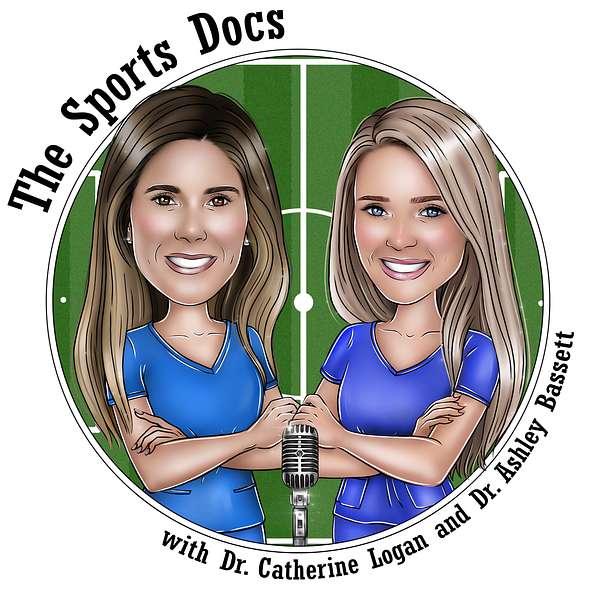
The Sports Docs Podcast
Sports medicine is a constantly evolving field, with hundreds of new articles published each month on the topic. This ever-growing wealth of information can make it challenging to stay updated on the newest approaches and techniques, and to know which data should actually change your practice. Join orthopedic surgeons, Dr. Catherine Logan and Dr. Ashley Bassett, as they chat about the most recent developments in sports medicine and dissect through all the noise.
On each episode of The Sports Docs podcast, the hosts will tackle a specific injury – from ACL tears to shoulder instability – and review the top research from various high-impact journals that month, including The American Journal of Sports Medicine, Arthroscopy: The Journal of Arthroscopic and Related Surgery, Sports Health, Journal of Shoulder and Elbow Surgeons, and more. The Sports Docs will also be joined by experts in the field of sports medicine – orthopedic surgeons, nonoperative sports medicine specialists, athletes, physical therapists, athletic trainers and others – to provide a fresh and well-rounded perspective based on their unique experiences.
The Sports Docs – Dr. Logan & Dr. Bassett – are friends & former co-residents from the Harvard Combined Orthopaedic Residency Program, who went onto esteemed sports medicine fellowships at The Steadman Clinic and The Rothman Institute, respectively. Dr. Logan practices in Denver, CO, and serves as Team Physician for Men's USA Lacrosse & as a Team Physician for U.S. Ski & Snowboard. Dr. Bassett is the director of the Women’s Sports Medicine Center at the Orthopedic Institute of New Jersey and practices across northern NJ, primarily in Morris and Sussex Counties.
Together, they will bring monthly conversations on how to care for athletes of all ages and levels of play, with a healthy mix of cutting-edge science and real-world application.
The Sports Docs Podcast
9. Dr. Robin West: Return to Play After Orthopaedic Injury - Part I
On today’s episode we’re focusing on return to play after various orthopedic injuries: what factors influence the timing of return, what criteria are used to determine clearance and how this all differs between sports.
We’re joined today by Dr. Robin West, Chairman of Inova Sports Medicine and head team physician for the Washington Nationals. Dr. West also has 18 years of experience in the National Football League, serving as a physician for both the Pittsburgh Steelers followed by the Washington Football Team. So we’re excited to hear her take on this topic of return to play, especially given her experience across a multitude of elite sports.
We have some great articles for you today that contribute well to our conversation on returning to sport after musculoskeletal injury. The first paper is a systematic review from the May 2019 issue of OJSM titled How Much Do Psychological Factors Affect Lack of Return to Play After ACL Reconstruction? Riley Williams and his team at HSS reported that 65% of athletes who did not return to play after ACL surgery cited a psychological reason for not returning, with fear of reinjury being the most common. Lack of confidence in the knee, depression and lack of interest or motivation were other reasons given. The authors also found that when psychological factors were present there was a prolonged time to return to play, at an average of 17.2 months across the included studies.
The next article we’ll be discussing also focuses on psychological factors that impact return to sport. From the July issue of AJSM this year, the paper is titled Factor Structure of the Shoulder Instability Return to Sport After Injury Scale. This scale was adapted from the ACL Return to Sport After Injury scale and is designed to measure the psychologic readiness to return to play after a shoulder dislocation. Authors Margie Olds and Kate Webster found that athletes return to sports after a shoulder dislocation relatively quickly, despite reporting high levels of fear and anxiety about reinjury. This may contribute to the high rate of recurrent shoulder instability in this population. Athletes who underwent surgical stabilization had significantly lower fear of reinjury.
We are honored to have Dr. Robin West join us for the discussion today. Dr. West is an orthopedic surgeon specializing in sports medicine and is the Chairman of Inova Sports Medicine and President of Inova’s Musculoskeletal Service Line. She is an associate professor at VCU School of Medicine and Georgetown University, and currently serves as the head team physician for the Washington Nationals baseball team. Dr. West earned her medical degree from George Washington University, where she also completed her orthopedic residency. She then went on to complete a fellowship in sports medicine at the University of Pittsburgh. Dr. West has extensive experience in the NFL, first as a team physician for the Pittsburgh Steelers and then head team physician for the Washington Football team. She currently serves on the board of directors of the NFL Physicians Society and NFL Scouting Medical Committee.